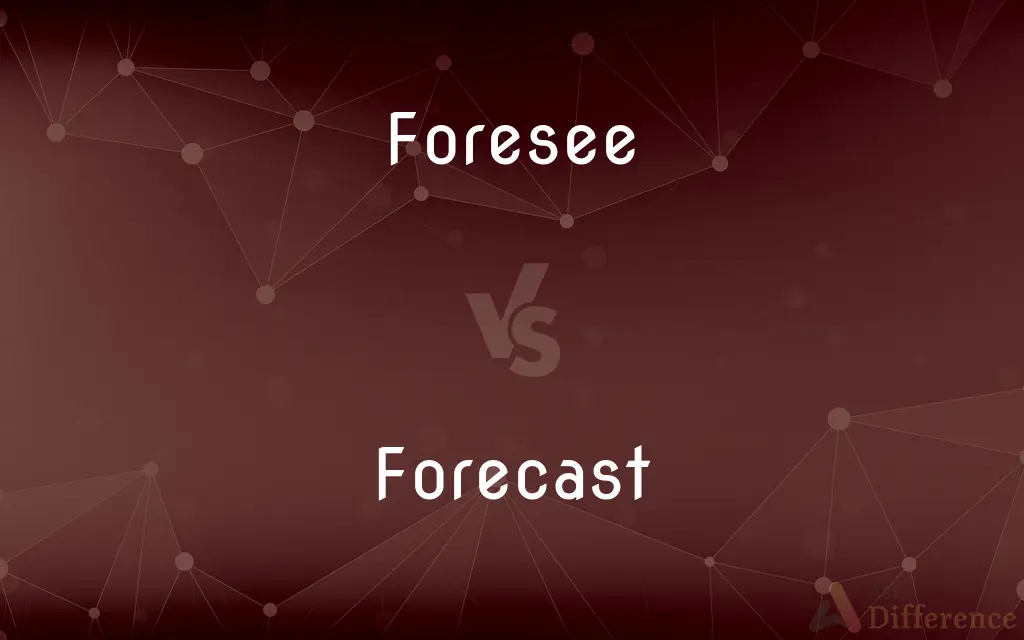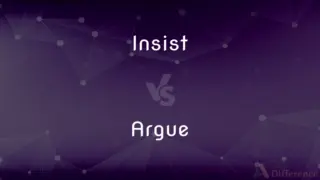Foresee vs. Forecast — What's the Difference?
Edited by Tayyaba Rehman — By Urooj Arif — Updated on April 15, 2024
"Foresee" involves anticipating or knowing in advance, typically based on intuition or experience, while "forecast" is a systematic prediction often using data and analytical methods.

Difference Between Foresee and Forecast
Table of Contents
ADVERTISEMENT
Key Differences
Foresee generally refers to the ability to perceive or predict an event before it happens, often relying on personal insight or past experiences. Whereas, forecast specifically involves the use of systematic methods, such as data analysis or models, to predict future events, particularly in fields like weather or economics.
Foresee is usually associated with a more intuitive or less formal approach to prediction. It often applies to individuals anticipating outcomes based on a subjective understanding. On the other hand, forecast is more formal and typically used in professional contexts where systematic techniques are applied to predict specific outcomes.
The term foresee can be used more broadly and does not necessarily require specialized knowledge or tools. It can be applied in everyday situations. In contrast, forecast often involves specific methodologies and is used in contexts such as scientific research, finance, and business planning.
Foresee often implies a certainty about the future that comes from personal conviction or obvious signs leading up to an event. Meanwhile, forecast usually represents an estimation and often comes with a degree of uncertainty, including probabilities or potential scenarios.
In usage, foresee is more likely to appear in literary or general discourse, emphasizing a more philosophical or thoughtful approach to the future. Conversely, forecast is frequently found in technical, business, or academic discussions, emphasizing a pragmatic approach based on empirical data.
ADVERTISEMENT
Comparison Chart
Basis of Prediction
Intuition, experience
Data, analytical methods
Formality
Informal, personal
Formal, systematic
Common Contexts
Everyday, philosophical
Scientific, business planning
Certainty
Often implies certainty
Often involves uncertainty
Usage in Language
Broader, general discourse
Specific, technical discourse
Compare with Definitions
Foresee
To anticipate and prepare for future needs or problems.
They foresaw the need for more staff.
Forecast
To predict future events or conditions, typically involving data.
Meteorologists forecast the weather for the week.
Foresee
To know beforehand; anticipate.
She could foresee trouble brewing at the meeting.
Forecast
To use past and present data to predict future outcomes.
Analysts forecast the election results with precision.
Foresee
To predict from an early point.
He foresaw his team winning the championship.
Forecast
To serve as a prediction of future events.
The data forecasts an increase in sales.
Foresee
To have a premonition of.
She foresaw that they would encounter many obstacles.
Forecast
To estimate or calculate in advance.
The economist forecasted next year’s growth as robust.
Foresee
To envision as a future possibility.
He foresaw the potential for growth in the industry.
Forecast
To outline or present a prediction based on current trends or data.
He forecasted a downturn in the market.
Foresee
To imagine or know as a probable occurrence; anticipate or predict
Foresaw economic decline.
Forecast
Predict or estimate (a future event or trend)
Coal consumption in Europe is forecast to increase
Rain is forecast for Scotland
Foresee
To be able to see beforehand: to anticipate; predict.
Forecast
A calculation or estimate of future events, especially coming weather or a financial trend.
Foresee
(obsolete) To provide.
Forecast
To estimate or predict in advance, especially to predict (weather conditions) by analysis of meteorological data.
Foresee
To see beforehand; to have prescience of; to foreknow.
A prudent man foreseeth the evil.
Forecast
To serve as an advance indication of; foreshadow
Price increases that forecast inflation.
Foresee
To provide.
Great shoals of people, which go on to populate, without foreseeing means of life.
Forecast
A prediction, as of coming events or conditions
The weather forecast stated that it would rain.
Foresee
To have or exercise foresight.
Forecast
To estimate how something will be in the future.
To forecast the weather, or a storm
To forecast a rise in prices
Foresee
Realize beforehand
Forecast
To foreshadow; to suggest something in advance.
Foresee
Picture to oneself; imagine possible;
I cannot envision him as President
Forecast
(obsolete) To contrive or plan beforehand.
Foresee
Act in advance of; deal with ahead of time
Forecast
An estimation of a future condition.
Forecast
A prediction of the weather.
What's the forecast for tomorrow?
Forecast
(betting) exacta
Forecast
To plan beforehand; to scheme; to project.
He shall forecast his devices against the strongholds.
Forecast
To foresee; to calculate beforehand, so as to provide for; as, to forecast the weather; to forecast prices.
It is wisdom to consider the end of things before we embark, and to forecast consequences.
Forecast
To contrive or plan beforehand.
If it happen as I did forecast.
Forecast
Previous contrivance or determination; predetermination.
He makes this difference to arise from the forecast and predetermination of the gods themselves.
Forecast
A calculation predicting future events; the foresight of consequences, and provision against them; prevision; premeditation; as, the weather forecast.
His calm, deliberate forecast better fitted him for the council than the camp.
Forecast
A prediction about how something (as the weather) will develop
Forecast
Predict in advance
Forecast
Judge to be probable
Forecast
Indicate by signs;
These signs bode bad news
Common Curiosities
How does forecasting differ from foreseeing in professional contexts?
Forecasting in professional contexts usually involves data and predictive models, unlike foreseeing which is more intuitive.
What does it mean to foresee an event?
To foresee an event means to have a prior understanding or intuitive sense that it will happen.
Is forecasting more reliable than foreseeing?
Forecasting can be more reliable when it involves comprehensive data and systematic methods, whereas foreseeing is subjective.
Can foreseeing be considered a skill?
Yes, foreseeing can be considered a skill, particularly as it relates to personal insight and experience.
What tools are commonly used in forecasting?
Common tools in forecasting include statistical software, algorithms, and predictive models.
Is forecasting applicable to all industries?
Yes, forecasting is applicable across various industries including economics, meteorology, business, and more, as it helps in planning and decision-making.
Can foreseeing be developed as a personal ability?
Yes, the ability to foresee outcomes can be developed with experience and by honing one’s intuition and observational skills.
How do organizations use forecasting in strategic planning?
Organizations use forecasting in strategic planning to predict market trends, prepare for future demands, allocate resources efficiently, and mitigate potential risks.
Can both foreseeing and forecasting be wrong?
Yes, both foreseeing and forecasting can be incorrect; foreseeing might fail due to subjective biases, while forecasting could be off due to inaccurate data or models.
What is the role of technology in forecasting?
Technology plays a crucial role in forecasting by providing tools for data analysis, computational models, and simulations that enhance prediction accuracy.
Does foreseeing involve any scientific methods?
Foreseeing generally does not involve scientific methods; it is more about intuition, personal insights, and experiential knowledge.
Share Your Discovery
Previous Comparison
Sprite vs. Gnome
Next Comparison
Insist vs. ArgueAuthor Spotlight
Written by
Urooj ArifUrooj is a skilled content writer at Ask Difference, known for her exceptional ability to simplify complex topics into engaging and informative content. With a passion for research and a flair for clear, concise writing, she consistently delivers articles that resonate with our diverse audience.
Edited by
Tayyaba RehmanTayyaba Rehman is a distinguished writer, currently serving as a primary contributor to askdifference.com. As a researcher in semantics and etymology, Tayyaba's passion for the complexity of languages and their distinctions has found a perfect home on the platform. Tayyaba delves into the intricacies of language, distinguishing between commonly confused words and phrases, thereby providing clarity for readers worldwide.














































